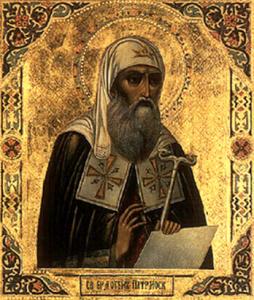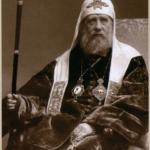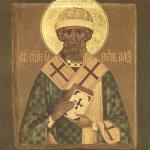 Patriarch Hermogenes loved the freedom to worship more than his own life.
Patriarch Hermogenes loved the freedom to worship more than his own life.
Could Russia be liberated? Could the Faithful be free of foreign rule? Moscow was in the hands of a foreign power in 1612. A wonderworker, a man who served the poor, left a heritage of great beauty, roused the people to fight, saved his Church, but at the cost of his own life.
Service to one’s nation is not the greatest loyalty, but is part of the duty of a Christian. We fear God and honor the emperor.
That duty has limits: the moral law. There is no right to vice and no law that commands vice or forbids virtue is just. We must obey God when a tyrant demands disobedience to the moral law. Generally, however, Christians have been able to live in peace in many types of governments and serve in every role inside that state, including emperor!
A Christian does so by avoiding extremes: jingoism or seperatism. The jingoist will serve his nation right or wrong, the Christian her wrongs to right. If there is grave danger in jingoism, and there is, there is equal danger of cowardice masquerading as “separatism.” Mainstream Christian faith understands that a man must be willing to die to defend or advance his nation’s virtues.
As another martyred Patriarch, Ignatius of Antioch, pointed out, we must not seek out martyrdom. We should pray and earnestly strive to live in peace with everyone. The teacher, evangelist, and prophet who reposes in peace such as Saint Nina, equal to the Apostles, is as honored as any martyr.
Nobody should confuse discomfort with “martyrdom” or irritation with persecution. Still, as the Christians in Egypt, Syria, and China are discovering, sometimes cruel regimes wish to make martyrs. Saint Patriarch Hermogenes had to stand firm in a situation where that stand was bound to cost him his life.
Why? Hermogenes was a Christian and so a patriot. He loved his motherland, not because it was better than any other, but because it was his own. He did his duty knowing that other Christians, in other lands, also had their own duties to perform. He recognized the sanctity of all the Faithful.
Saint Hermogenes knew the balance. As a pastor, Hermogenes made sure that any ethnicity that came to the Faith and died would be remembered by the church equally. He understood that orthodoxy knows no ethnic boundaries: the faithful Russian must have no advantage or greater honor compared to the faithful Tatar. This was remarkable given the centuries of hostility that had existed between the two groups.
He sought out saints and honored their memory. He discovered the priceless Kazan Icon of the Mother of God. When civil war and foreign invasion threatened peace, the Patriarch worked for peace, but would not buy peace, or even his own life, at the expense of the truth.
The saint firmly replied, “What are your threats to me? I fear only God. If all our enemies leave Moscow, I shall bless the Russian militia to withdraw from Moscow; but if you remain here, I shall bless all to stand against you and to die for the Orthodox Faith.” His captors starved him to death.
Patriarch Hermogenes was not afraid of those who only could kill the body, so kept safe his soul. He did his duty and so his people honor his name.
May we all be like Patriarch Hermogenes.
—————–
Pope or patriarch it is often fashionable to kill church leaders:
- Ecumenical Patriarch Gregory V: a patriarch martyred by empire and a father of the Greek nation.
- Patriarch Tikhon: a patriarch martyred by a Marxist regime and a father of American Orthodoxy.











